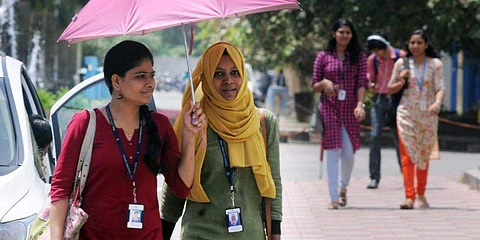

A Rapid Assessment Study report has revealed that young women have found the pandemic more stressful than men for multiple reasons ranging from extra workload at home, family pressure to discontinue education and even an unmet need for sanitary napkins.
The survey has been conducted by National NGO Population Foundation of India in May earlier this year across the three Indian stated of Uttar Pradesh, Rajasthan and Bihar to asses the impact of COVID-19 on young people (age 10-24).
Almost 9 out of every 10 young women (89 per cent) in Uttar Pradesh has been seeking help for mental health during the lockdown period.
However, only 5 out of 10 women felt the need to talk about mental health issues and found the information and support for mental health as helpful.
Additionally, 6 out of 10 young women has reported an increase in their workload, the study revealed.
In Uttar Pradesh, 67 per cent of women below 18 years of age and 55 pc of those who were 18 years and older reported an increase in domestic workloads.
The study carried out found that nearly 1 of 4 respondents reported an increase in conflicts at home and experienced depression.
Other findings of the survey in UP revealed that 19 pc of young women reported an unmet need for sanitary napkins.
With schools closed and a general restriction in movement, young women in various sections of society were forced to go back to using cloth instead of sanitary pad during menstruation.
Besides 10 pc of respondents reported an increase in tension and fights at home during the lockdown while 68 pc of the young respondents surveyed in Uttar Pradesh said they are now spending more time on social media than pre lockdown.
Not a single respondent said that schools were the source of information on COVID-19, however this should be understood in the context of a nationwide lockdown that had closed schools across the country.
21% said whatsapp and 37% said TV were the sources of information underlining the failure of the school system to be information disseminators, the survey stated.
Ms Poonam Muttreja, Executive Director, Population Foundation of India said here on Thursday that young women seem to be the worst affected by the pandemic and not only in India but also globally.
"It is evidently clear from the findings of the Rapid Assessment Study that critical attention needs to be paid towards young people.
Our approach to policy and programmes needs to understand their specific needs and provide solutions accordingly.
With schools still shut in most parts of the country, the absence of interaction and engagement will exacerbate the situation.
Data from the surveys shows that Frontline Workers are uniquely positioned in their communities to address the health needs of our young people.
It is critical at this time to equip our healthcare workers with the tools and materials to healp young people across the country," Ms Poonam said.
In UP the sample size of young people between the age group of 15 to 24 years is 801 which consists of 271 boys and 530 girls.
